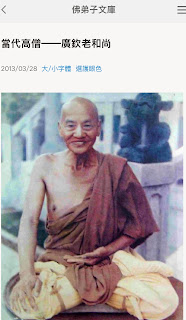剝落4
三十幾年前有一次跟目前還任職仁愛鄉親愛國小的李文宗主任
跟洪雅玲老師到玉山半山腰遊蕩,
漫無目的走著,閑晃間看到一塊大石頭坐了一下,瞬間竟然有
入定的感覺,大概只享受1分鐘吧,嚇一跳趕快跳起來!
那1分鐘懂了最好的入定場所是大山。
為什麼會嚇一大跳?
我最大的渴望是能明白佛法的內容,(況且原始教典《阿含
經》的研究才剛開始在臺灣興起),
而不是入定,面對廣欽老和尚那座入定大山時,我也是這種感
覺。
還沒入住屏東潮州之前,蔡醫師讓沛宏載我去他們高雄甲仙的
一塊地看看要捐出宏法,
我礙於住山需要人手多,而且我要查佛法資料那時還沒有網
路,也是住平地方便而婉拒,
清楚明白佛法的內容一直是我心心念念的事。
妄有、虛幻之佛法形容詞我一度歡喜,但腳要踏在哪裡?不用
踏著直接昇華嗎?
如來藏、真如、唯識種種一定要把這些搞清楚,不然日夜難
安!
入住潮州後,開始專心研讀之路,
研讀的內容也是我陸陸續續寫出的文章。
半寄
(這一兩年有人也寫出了去爬大山有過的輕安感,我有把那一
段文章貼在南禪臉書讀者可以自己找找)
Peeling
Off 4
Greetings,
friends of NanZen!
Over
30 years ago, I went hiking on the lower slopes of Mt. Jade with Director
WenZong Li, who still works at Qingai Elementary School in Renai Township, and
Ya-Ling Hong. We were walking aimlessly, and during the stroll, I sat on a
large rock. In that instant, I unexpectedly experienced a state of deep
meditation—probably only for about a minute. I was so startled that I quickly
jumped up!
In
that brief minute, I realized that the best place for meditation is in the
mountains.
Why
was I so surprised? My greatest desire has always been to understand the true
essence of Buddhist teachings, not merely to meditate. (Especially since
research on the original scriptures, the
‘Agama Sutras’, had just begun to emerge in Taiwan at the time.)
I
had a similar feeling when I encountered Master Guangqin’s meditation mountain.
Before
I moved to Chaozhou, Pingtung, Dr. Tsai suggested that Pei-Hong and I visit a
piece of land in Jiasian, Kaohsiung, which they were planning to donate for a
Dharma center. I declined politely because living in the mountains would
require many people. And I needed to study Buddhist texts and there was no
internet at that time. I preferred living in a more accessible, flat area.
Understanding
Buddhist teachings clearly has always been my constant focus. I was once happy
with the abstract and illusory descriptions of Buddhism, but I kept asking
myself: Which path should I step on? Can a appraoch without solid fountation of
Buddhist Dharma transcend directly and succeed? I had to clarify concepts like
Tathāgatagarbha (Buddha-nature), Tathātā (thusness or suchness), and Vijñaptimātratā
(consciousness only), or I would be restless day and night!
After
moving to Chaozhou, I focused more on my study of Buddhist teachings, and the
content of my research has gradually formed the articles I’ve written over
time.
(Recently,
someone has written about the peaceful feeling they experienced while climbing
a mountain. I posted that article on the NanZen Facebook page, where readers
can find it.)
Master Banji



